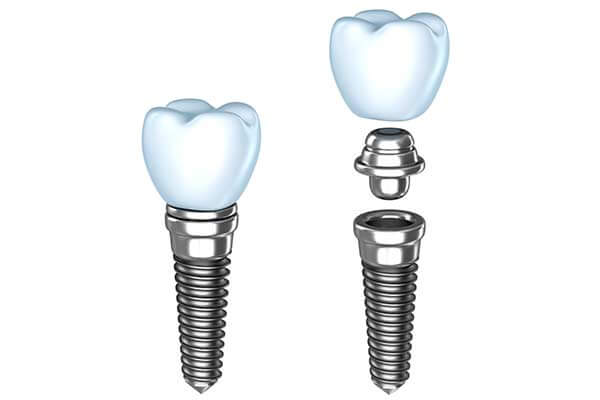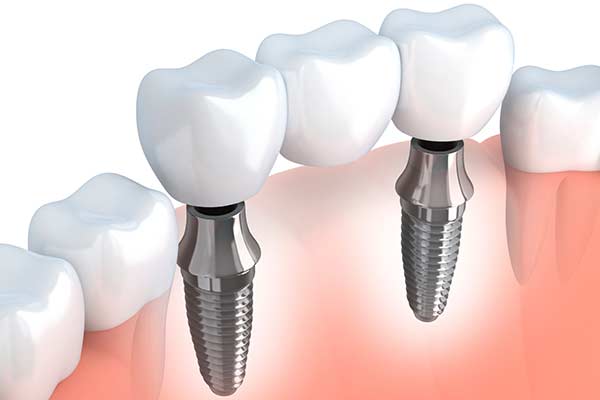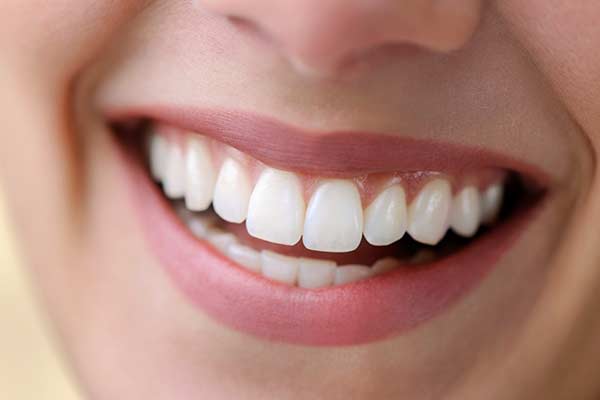Dental Implants
Dental Implants in West Milford, NJ

Agnieszka Jamrozek, DMD, provides dental implants in West Milford, NJ. Call 973-728-3779 to learn more and schedule your appointment.
Dental implants serve as a replacement for tooth roots. They create a durable, stable foundation for either removable or fixed replacement teeth. Placed in the jawbone, dental implants actually osseointegrate, or fuse with the bone, over a period of months. Abutment posts are then attached to the implants and capped with the replacement teeth. One dental implant can support one restoration, while a handful of implants can support an entire upper or lower arch.
Implant Supported Bridge

When three or more adjacent teeth are missing, an implant supported bridge can help. Two implants are used, one at each end of the span of missing teeth. Pontics, or synthetic teeth, are attached to the bridge, which is anchored to the implants.
Implant Supported Dentures

Implant supported dentures come in two types: removable and fixed. A removable implant supported denture can be secured with just two implants. Rather than using denture pastes or adhesives, the denture simply snaps onto the implants. It can be removed at night or for cleaning.
A fixed implant supported denture requires four or more implants. The implants are strategically placed to distribute bite forces, and the denture is secured into place by your dentist. This type of denture looks and functions the most like natural teeth.
Regardless of which implant option you choose, a major advantage of implants is that they stimulate jawbone growth. Wearing dentures, which rest on the gums, can lead to bone loss and a sunken appearance. The implants take the place of tooth roots, preventing and even reversing bone loss, and giving you a more youthful appearance.
If you are in West Milford and would like to know how dental implants can restore your smile, please give us a call today (973) 728-3779 to schedule your initial appointment.
Dental Implants FAQ
Can a bridge be replaced with an implant?
Traditional bridges can be replaced with dental implants. If three or more adjacent teeth are missing, an implant-supported bridge can be used to replace them. This type of restoration relies on dental implants for support rather than using healthy teeth as abutments, which is better for your overall oral health.
Are implant-supported dentures permanent?
The dentures held in place by dental implants can be either fixed or removable, but the dental implants themselves—the screws or posts that are implanted into the jaw to support the dentures—are a permanent, lifelong restoration.
How long do implant-supported dentures last?
The dental implants that anchor your dentures in place can last a lifetime with proper care and maintenance. The dentures themselves usually last about 20 years, depending on the type you choose, the material they’re made from, and the amount of wear they receive.
How painful is getting dental implants?
Getting dental implants is not painful at all. Prior to your dental implant surgery, we will numb the area where we’re working with local anesthetic to ensure that you don’t feel anything during the procedure. When the anesthesia begins to wear off in the hours after your surgery, you will begin to experience some discomfort. Most patients report that the pain involved in getting dental implants is less than that of having a tooth extracted. Over-the-counter pain relievers and cold compresses can be used to alleviate any soreness and inflammation.
Can two implants support an upper denture?
Two implants may be able to support a partial denture, depending on the size needed, but for a full arch of replacement teeth, usually four dental implants is the absolute minimum number needed. During your initial consultation, we’ll go over how many dental implants are required for your restoration.
How many implants are needed for dentures?
Anywhere from four to five or six dental implants are needed to support a full arch of dentures, with fewer required for partial dentures.
Can I get dental implants if I have bone loss?
Yes, you can still get dental implants even if you’ve experienced bone loss. In fact, dental implants are a great choice for such patients because they can reverse bone loss in the jaw. If bone loss is extensive, mini dental implants may be an option—these are smaller and more lightweight, so they do not require as much jaw support as traditional dental implants. In other cases, you may need to have bone grafting or a sinus lift to augment the jawbone before undergoing surgery.
Who is not suitable for dental implants?
If you have active gum disease, uncontrolled diabetes, or other conditions that make surgery risky, you are not a candidate for dental implants. Taking certain medications, like those that suppress the immune system, also precludes you from dental implant surgery. Certain habits, like teeth grinding, jaw clenching, and smoking, can put you at a higher risk of dental implant failure.
Can your body reject dental implants?
In very rare cases, the body may reject dental implants or you may have an undiagnosed metal allergy. The biocompatible titanium used to make dental implants is specifically chosen because of its low risk of rejection—it’s the same material used in joint replacements elsewhere in the body.